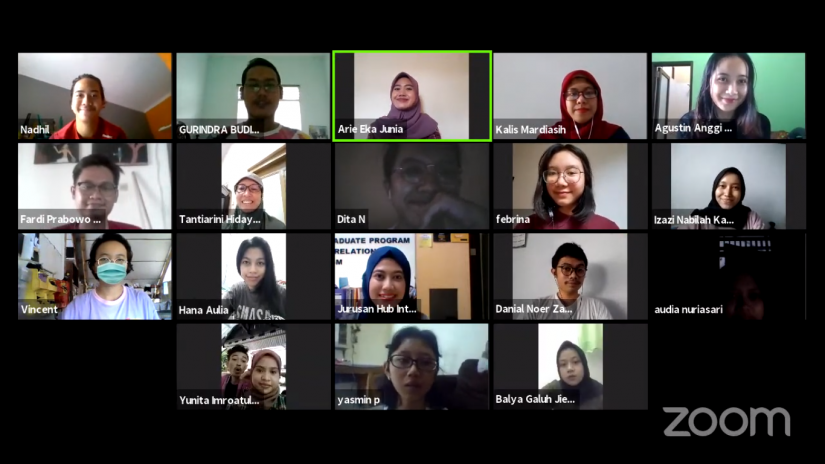
Yogyakarta, November 12th 2020—Career Development Center (CDC) came back with the third Mental Health Society on Thursday (12/11). In this occasion, CDC brought the theme Recognizing Gender Based Violence and Healthy Relationships. This webinar presented Kalis Mardiasih (Gender Equality Campaigner) and Vincent from PLUSH and it was moderated by Arie Eka Junia from Fisipol Crisis Center UGM.
This event was organized by the CDC in collaboration with peer counselors and the Fisipol Crisis Center. The FCC is a unit under the CDC which is responsible for handling and preventing cases of sexual violence that occur against the members of the Faculty of Social and Political Sciences of UGM.
In this discussion, the speakers invited us to understand about Gender Based Violence (GBV). GBV is an umbrella term for acts of violence, either it is physical, psychological, sexual, socio-economic, online, based on gender. GBV is rooted in gender norms and power relations where the gender of the survivor is considered subordinate. The forms of violence vary and those involve multiple perpetrators and whoever is at risk of experiencing it.
Meanwhile, online GBV happened on digital platforms and facilitated by technologies and it was the extension of offline gender based violence. The facts show that OGBV experienced an increase when internet technology was more accessible. CATAHU 2020 reported 281 cases of OGBV throughout 2019, and the COVID-19 pandemic made an increase in OGBV cases. As many as 95% of cases targeted female gender in the form of aggressive behavior, harassment, use of harsh and degrading words, and exploitation of body-targeted photos (UN). Meanwhile, there are 60% women in the world experiencing OGBV (take back the tech). “So, looking at this data with the majority of female gender, I suspect it could be that the reporters are actually female but still read as female,” Vincent said.
Vincent said the forms of OGBV include: online harassment/trolling, dogpiling/cyber-mob attacks, cyberstalking, doxing, outing, hacking, impersonation (falsification of profiles), defamation, pornography, child pornography, alteration (distortion of photos and videos), honey traps, distribution of non-consensual intimate photos/videos, blackmail, and sextortion. In one case that must be considered, a survivor was vulnerable to experiencing more than one OGBV act. A person who performs OGBV has various motivations, such as silencing/controlling; revenge, jealousy, anger; destruction of dignity; criminalization; as well as extortion/political agenda. The impact can be in the form of loss of economic opportunity, fear and trauma, isolation, surrender to control, physical injury, criminalization, and even death.
According to Vincent, offline and online GBV cannot actually be prevented as long as we still choose to live under a patriarchal culture, which is continuous with the norms of heteronormativity. “So, we all remain vulnerable even to the extent that we limit our privacy,” she added. However, if OGBV occurs, the handling below is specifically for complaints by:
- Social: accompany the survivors, identify forms of OGBV, document them as evidence, explore options for handling the case, help survivors decide, and form a support system.
- Technology: securing all digital devices and online accounts, investigating, finding out the IP address of the perpetrator, reporting and taking down related content, ignoring and temporarily disconnecting, taking over surveillance and tracing.
- Law: requesting legal assistance (legal advisors), making reports to the police, complaints to KOMNAS Perempuan, protecting survivors and witnesses.
- Psychology: Become and seek peer supports, refer survivors for counseling access to psychologists with a gender perspective.
A patriarchal culture has the potential to lead to gender-based violence. According to Kalis, we are used to being brought up with parenting patterns that classify roles based on gender. For example, women identical with domestic business and men identical with public business. To reduce GBV, Kalis said that healthy relationships based on equality are needed, such as mutual respect and mutual trust. The broadcasts of the discussion can be seen on the YouTube channel of Fisipol UGM.
